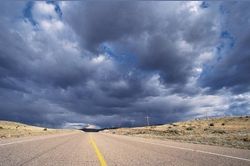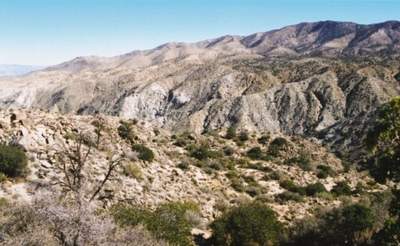When It Happens, It's Better to Have Prepared Yourself
Not that there aren't perils aplenty in cold weather, or even in
balmy weather, when you're down, somewhere -- and lost. It's just
that hot weather can make everything more-critical.
 In the first
place, your engine has the added stress of the higher temperatures:
your oil stays hotter; cabin air is hotter (or you're adding stress
to the engine, running the air conditioning); there are higher
density altitudes to contend with; and you're more-impatient to get
to altitude.
In the first
place, your engine has the added stress of the higher temperatures:
your oil stays hotter; cabin air is hotter (or you're adding stress
to the engine, running the air conditioning); there are higher
density altitudes to contend with; and you're more-impatient to get
to altitude.
Then, when your mill poops out and you're gliding, you won't
glide as far.
Once you've landed, your own survival becomes critical. You
know you can live for weeks without food [some of us more than
others --ed.]; but you're literally 'toast' without water,
sometimes in mere hours. What -- you brought water, in that flimsy
gallon jug, and it burst open? Bummer to be you.
Great tips on flying ("Fly high, and within gliding distance of
a highway") and on survival in the inhospitable great open spaces,
are found in the FAA's archives. H. Dean Chamberlain's article,
"Keeping Safe in the Desert," is a particularly good read,
especially as you plan that cross-country to the airshow or
fly-in.
Chamberlain offers great advice on everything from flying to
trip prep. He touches on topics as seemingly unrelated as cell
phone coverage and flight plan filing; and as important as first
aid and sunstroke.
He took the photos, too (as below); and if you've never been out
West (poor dude!), you can get a good idea of just what you may
face, if you go down when you don't want to. Remember: it's all
about water, and getting found!

Chamberlain's "Ten Commandments" are well worth repeating
here:
1. Hold on to a survival attitude. Your most valuable asset in
any life-threatening situation is a positive mental attitude. If
you aren’t certain you can live, you will die.
2. Stay where you are—Stay calm. If you are driving a
vehicle, remain with it. Relocate only to reach safety and
water.
3. MOVE ONLY WHEN ABSOLUTELY NECESSARY AND ONLY AT NIGHT. If
your position is unendurable, change your location during the
cooler night hours. Move only when you know you can get there
safely by doing the following:
a. Leave a clear trail with notes and directional signs.
b. On the note, give your name, date, time, direction, and reason
you are going.
c. Proceed in a specific direction; change your line of movement
only after you have left a sign or marker.
d. Go slowly and carefully—beware of overexertion.
 4. CONSERVE
YOUR SWEAT, NOT YOUR WATER. Rest by day; work on shelter and
signals during cool of evening/morning. DRINK as often as you need
water. Rub your body with urine and other liquids to keep cool.
4. CONSERVE
YOUR SWEAT, NOT YOUR WATER. Rest by day; work on shelter and
signals during cool of evening/morning. DRINK as often as you need
water. Rub your body with urine and other liquids to keep cool.
5. PROTECT YOUR BODY. When in the sun and heat remember
to:
a. Keep your clothes on. Loosen, but do not remove them.
b. Keep your boots/shoes and headgear on.
c. Relax in deep shade, keeping your eyes protected from
glare.
d. If in the open with no shade nearby, use anything available to
make shade.
6. MAKE A FUSS WHEN YOU HEAR OR SEE OTHERS NEARBY.
a. Signal by any means at hand. Use a shaving mirror to reflect the
sun. Wave a brightly colored item.
b. Make marks in the sand or lay out rocks large enough to be seen
from the air: SOS or HELP.
c. Start Fire—smoke in the daytime and flame at night.
d. Get involved in your rescue but conserve your body water.
7. DO NOT EAT ANYTHING.
a. All food is water demanding. Water is drawn out of your system
to process, digest, and eliminate what you eat.
b. No salt or salt tabs—they will dehydrate you.
8. KEEP YOUR MOUTH CLOSED. Breathe through your nose to minimize
evaporative water loss.
9. THINK LIKE A SEARCHER. Do the things that will make it easier
for your rescuers to help you.
a. Leave a clear trail with notes and directional signs.
b. On the note, give your name, day, time, direction, and reason
you are going.
c. Have a goal in mind—go in one direction with care. AVOID
INJURY.
10. USE YOUR HEAD, NOT YOUR SWEAT; DRINK THE WATER YOU HAVE.
Never ration water! Drink what you have as you need it. Discipline
is essential to survive.
Excellent advice, and good reading. Click on this link before
your next trip!
 ANN's Daily Aero-Linx (06.29.25)
ANN's Daily Aero-Linx (06.29.25) ANN's Daily Aero-Term (06.29.25): Gross Navigation Error (GNE)
ANN's Daily Aero-Term (06.29.25): Gross Navigation Error (GNE) Classic Aero-TV: Anticipating Futurespace - Blue Origin Visits Airventure 2017
Classic Aero-TV: Anticipating Futurespace - Blue Origin Visits Airventure 2017 NTSB Final Report: Cirrus SR22
NTSB Final Report: Cirrus SR22 Airborne Affordable Flyers 06.26.25: PA18 Upgrades, Delta Force, Rhinebeck
Airborne Affordable Flyers 06.26.25: PA18 Upgrades, Delta Force, Rhinebeck





